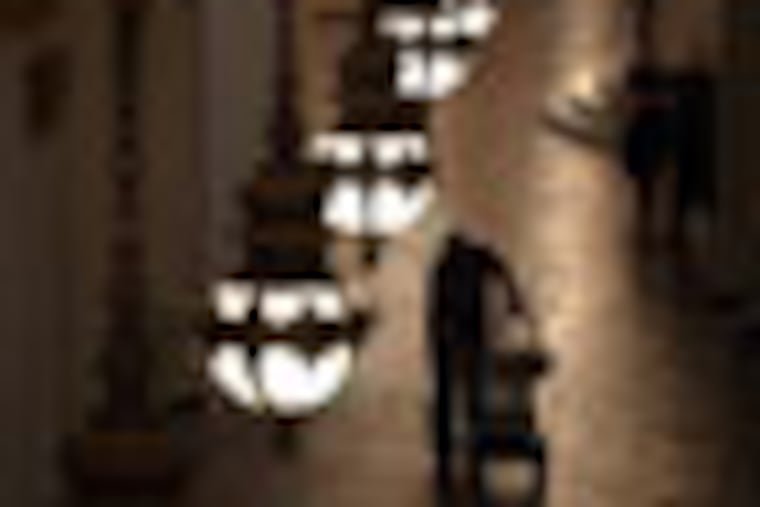Making Pa. legislature part-time finds some support
HARRISBURG - The Labor Day holiday traditionally marks the end of summer and a renewed focus on work for most Pennsylvanians.

HARRISBURG - The Labor Day holiday traditionally marks the end of summer and a renewed focus on work for most Pennsylvanians.
Not so for the state's lawmakers.
No, their summer idyll doesn't end until Sept. 24, after a nearly three-month break.
When they return, they will spend little more than a few weeks in session before taking another leave in mid-October, and they do not return until mid-January.
All told, Pennsylvania's General Assembly, the largest full-time legislature in the nation, will be in session for roughly two months, or 60 working days, this year - about the same number of voting days as Maryland's part-time legislature's regular session.
The legislative calendar, a two-year cycle of long holiday breaks punctuated by short bill-passing sprints, has been the source of debate for decades.
Legislative leaders contend they engage in important business - constituent services, bill drafting, and hearings - when they are not in the Capitol.
But critics say the fits-and-starts calendar does not lend itself to good lawmaking and argue it's time Pennsylvania returned to a part-time lawmaking body like most other states. As a part-time body, the legislature would meet in one compressed session and its members would have the rest of the year to hold other jobs.
"It worked for three centuries," said State Rep. Bryan Cutler (R., Lancaster), lead sponsor of a bill that would reinstitute by constitutional amendment the legislature's part-time status, which it had before 1968.
"The core question is: What is the function of the legislature?" Cutler said in an interview. "I think we should concentrate on core duties: passing a budget and passing laws."
Most states have what the National Conference of State Legislatures calls "hybrid" governing bodies, in which lawmakers work as much as 70 percent of the year on official business but also hold other jobs.
The Delaware and Maryland legislatures meet for single six-month and three-month sessions respectively, beginning in January each year. In both states, special sessions can be convened to tackle specific issues later in the year.
New Jersey lawmakers meet throughout the year in what is considered "near-full-time" status. Last year, the Senate held 39 session days and the Assembly held 30.
"You can make a compelling case given the scheduling of legislative session days that Pennsylvania could be a part-time legislature," said G. Terry Madonna, a political analyst at Franklin and Marshall College. "The current system inherently creates inefficiency. There's no continuity, and the hours spent legislating were not much different than when they were part time."
The General Assembly shifted to full-time operation four decades ago, following recommendations made by a legislative "modernization" commission led by author James Michener.
The commission concluded that a full-time body would help balance the branches of power - an argument still made today - and lessen the power of lobbyists if there was a professional staff to draft bills.
That balance-of-powers argument is made by the House leadership today as a reason to maintain the status quo.
"Three branches are co-equal - if you take the powers of one away, it shifts," said Steve Miskin, spokesman for House Majority Leader Mike Turzai (R., Allegheny). "Legislative oversight is right and proper. It's a check and balance."
"That is common, for a full-time legislature to take significant breaks," said Brenda Erickson, senior research analyst with the National Conference of State Legislature. "It doesn't mean no work being done."
Rank-and-file members of the Pennsylvania legislature, who make a base salary of $81,000, have no set hours or number of work days.
"They work 24/7, whether in church or synagogue, mowing their lawns," Miskin said. "Working in the chambers is just part of the job."
Supporters of a full-time legislature say lawmakers use the non-session days to draft legislation and help constituents cut through government red tape to get state permits and licenses and secure government benefits.
Former State Rep. Jeff Coleman said the calendar was designed more for effective campaigning and fund-raising - and, others contend, loafing - than maximum government productivity.
"The expectation is when you're off the calendar, you better be active in the district, working the county fairs, judging the prize pig," said Coleman, now a political consultant in Harrisburg. "Leaders expect you to raise X amount of dollars. So you are knocking on doors and shaking hands."
Coleman said that even when lawmakers are in Harrisburg, much of the conversation on major issues takes place among leaders, so for rank-and-filers, it's a lot of "sit around and wait."
"Harrisburg culture is two extremes: you're productive and engaged, or you feel like you're sitting in an elegant frat house," said Coleman, a Republican from Armstrong County who served two terms before retiring in 2004.
"A truncated schedule would force public debate," Coleman said. "It would give enough time to engage and give real flexibility that would allow lawmakers to conduct legislative business and still hold jobs in the private sector."
But Senate Majority Leader Dominic Pileggi (R., Delaware) said one could argue both sides about the efficacy of more time in the Capitol.
"I think where we are is a good medium," he said. "Constituents know we're not in session, particularly in the summer, so requests for meetings increase. People expect you to be more available.
"We are trying to make Pennsylvania a better place to live. It's not about whether we're in for a certain number of days."
Inquirer staff writer Joelle Farrell contributed to this article.